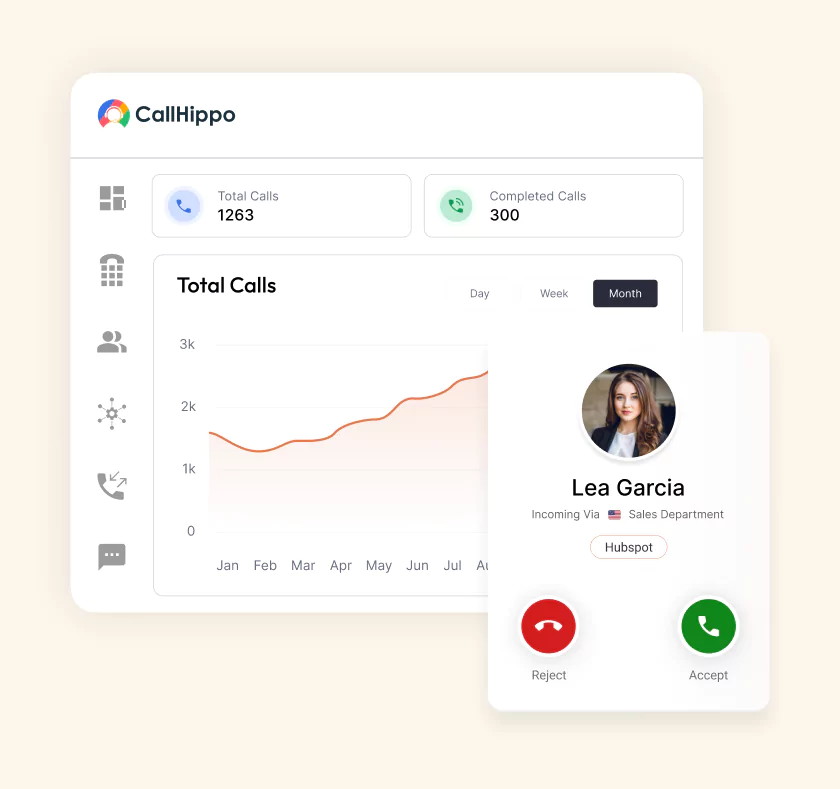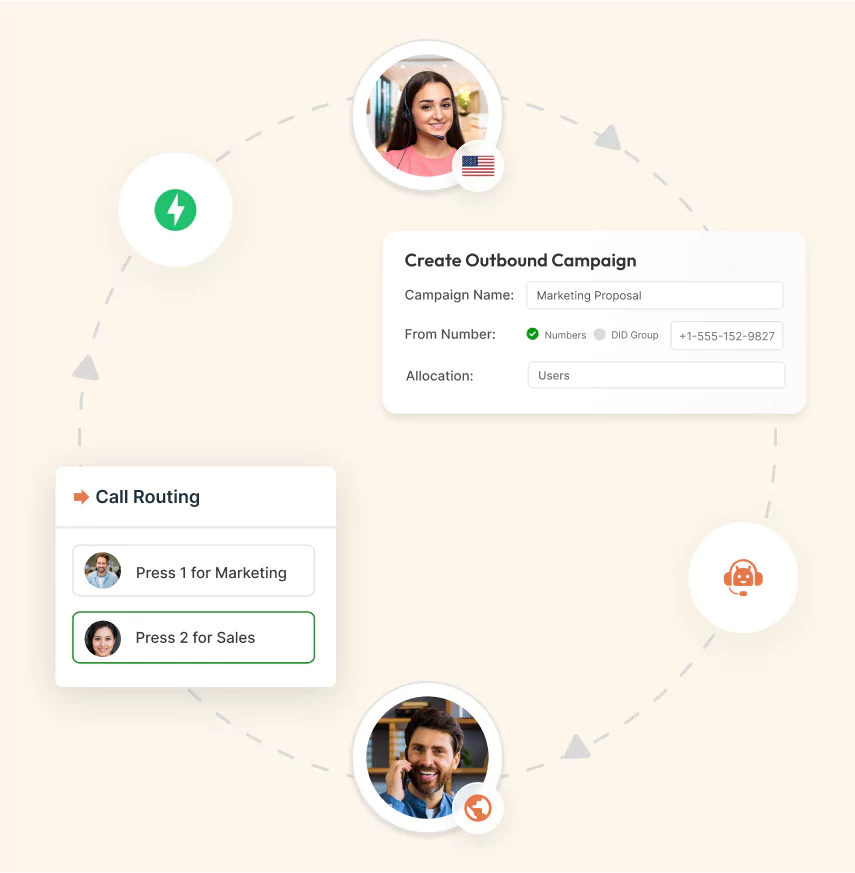Get Virtual Call Center Software
Running a good call center today means handling phone calls, messages, and support requests well. CallHippo’s virtual call center software brings together everything your remote team needs, including virtual call center agents. No more lost connections or late responses.
- Make customer interactions easier with automatic call routing and management.
- Handle voice calls, chats, and voicemails all in one simple contact center platform.
- Stay connected anywhere with mobile apps for smooth communication.

What Is Virtual Call Center Software?
Virtual call center software helps businesses handle both incoming and outgoing customer calls. Unlike old call center systems, it makes call routing easier. It also handles messages better, facilitating self-service and tracks how well things work.
With CallHippo, you get reliable call management, text support, and video meetings. Everything works on one contact center platform, supported by remote call center software. We also give you virtual phone numbers from places around the world.
Search for a Virtual Phone Number for Your Business
Find the ideal virtual business phone number to streamline your communication and improve customer interaction.
Local
Toll-free
Mobile

How Does a Virtual Call Center Software Work?
Virtual contact center software makes communication easier. It uses cloud-based center technology for good call management, incorporating interactive voice response. It gives real-time data and smooth service across different ways to contact customers.
Virtual contact centers use Voice over Internet Protocol (VoIP) technology. This sends voice calls over the internet. It gives a reliable and cost-effective solution, unlike a traditional call center. Businesses can manage phone calls from any location while keeping good call quality.
Automatic call distribution technology routes incoming calls well. It sends calls to the best center agents based on rules you set. This includes who's available or who knows what. Customers connect to the right person without waiting.
The service provider handles the infrastructure and center technology. They manage software updates and server maintenance. They also handle data security. This keeps the system running smoothly without needing your own technical team.
What Are the Types of Virtual Call Centers?
Virtual contact centers come in different types. Each one meets specific business needs. Here are the main types used to make customer interactions and center operations better.
- Inbound Call Centers
Inbound call centers handle all incoming customer calls. They provide technical support and answer questions. They also process orders and solve problems. They focus on giving great customer service and fast responses. - Outbound Call Centers
Outbound call centers reach out to customers through outbound calls. They handle sales calls, follow-ups, and surveys. They also do telemarketing. This type helps businesses build customer relationships and drive sales. - Blended Call Centers
Blended call centers handle both incoming and outgoing calls. This flexible model lets businesses answer customer questions. They can also do sales, follow-ups, and outreach. This improves center service and creates more business growth opportunities.

What Are the Benefits of Adopting a Virtual Call Center Platform?
Using a virtual contact center platform makes communication better. It costs less and makes customers happier. Sales teams work together better. Call center agents have all the tools they need, especially virtual call center software. Businesses can grow easily too.
Smart call routing and voice menus make fewer unnecessary calls. Team tools help agents work together. This means faster responses and better customer experience.
Cloud contact center solutions don't need expensive equipment. You don't need office space either. This costs less than old systems that you keep on premises.
Faster call routing gives clearer connections. Customer data helps center agents solve problems faster. They can make interactions more personal across different ways to contact you.
Encrypt calls and control who can access what. Follow local rules to keep data private. This protects sensitive customer history and information.
Give remote team members mobile apps and softphones. Add browser calling for steady center service. This works no matter where they work from.
Add users, phone numbers, and features when you need them. Support business growth without needing complex infrastructure changes. No need for additional office space either.
What Are the Key Features of Virtual Call Center Solutions?
Virtual call center solutions have key features that make customer service better. These include call management, voicemail, voice menus, and automatic routing. They also connect easily with other business tools.
Direct incoming customer calls to the right call center agents. Use call forwarding and routing to make wait times shorter. This spreads the work evenly across your remote agents.
Make sure no calls get missed with voicemail. Agents can check messages from mobile devices. They can get messages from anywhere without needing office space.
Record calls to follow rules and check quality. Use reports to watch how agents work. Track call volume and make smart choices. This helps make customers happier.
Automatically greet callers and send them to the right department. Use voice menus to make fewer transfers needed. This helps everything work better.
Let remote agents handle calls and messages from anywhere. Give them mobile apps, computer software, and browser calling. This works even with a basic internet connection.
Connect your virtual contact center with customer management tools. This gives agents the customer history and background. It makes conversations smoother and more personal.
Handle all customer talks in one place. This includes voice calls, messages, and chats across different contact methods. It makes communication easier and replies faster.
Make agents work better with AI features. These include live call writing and understanding customer feelings. Automatic follow-ups help give great customer service.
Pricing
- 1 Free Phone Number
Toll-free number not included.
- Free WhatsApp Business API
- Voicemail
- Click To Dial
- AI Global Connect
Identify phone number's timezone before a call
- SMS (Text messages) & MMS
- Everything in Basic + Telephony
-
Unlimited Minutes (Includes Both Landline & Mobile Calling)
Free minutes are shared by all account users. Calling on special and premium numbers are excluded.
- 100 SMS (Text Messages)
Standard A2P charges apply.
- Basic Report Analytics
- Everything in Starter +
-
Unlimited Minutes (Includes Both Landline & Mobile Calling)
Free minutes are shared by all account users. Calling on special and premium numbers are excluded.
- 500 SMS (Text Messages)
Standard A2P charges apply.
- Call Recordings
- AI Reports / Analytics
Smart reports that summarize user & call activity.
- Everything in Professional +
-
Unlimited Minutes (Includes Both Landline & Mobile Calling)
Free minutes are shared by all account users. Calling on special and premium numbers are excluded.
- 1000 SMS (Text Messages)
Standard A2P charges apply.
- Dedicated Account Manager
- Custom Integrations
- Single Sign On (SSO)
Securely log into multiple apps with one set of credentials.
Traditional vs. Virtual Call Center
A traditional call center needs physical office space. Agents work in one location. A virtual contact center works through the internet. Call center agents can work from anywhere while still giving smooth and good customer service.
| Feature | Traditional Call Center | Virtual Call Center |
|---|---|---|
| Location of Agents | Agents work from a central office space. | Remote agents work from any location. |
| Infrastructure | Needs physical office space and equipment. | Cloud contact center solutions, no physical infrastructure needed. |
| Call Routing | Call routing is limited by the physical phone system. | Smart routing using cloud center technology. |
| Cost | Higher due to office space, hardware, and maintenance. | Lower operating costs due to no physical infrastructure needed. |
| Scalability | Growing requires more office space and equipment. | Easy to scale by adding call center agents and features without infrastructure changes. |
| Flexibility | Limited to fixed office hours and location. | Flexible, with center agents working from anywhere and different hours. |
| Management | Managed on-site with a physical presence. | Managed remotely with real-time data and workforce management tools. |
How to Choose the Right Virtual Contact Center Software?
Choosing the best call center software means understanding your business needs. Look at software features and think about the budget. Make sure you get good vendor support. Here are key things to help you make a smart choice.
Assessing Business Needs and Call Volume
Think about what your business needs specifically. Look at how many customer calls you handle. This helps you choose the best contact center solution.
- Find out how many phone calls you handle daily or monthly.
- Choose call center software that can grow with more call volume.
- Make sure it meets specific needs like customer support, sales teams, or technical support.
Evaluating Software Features and Integrations
Make sure the call center platform has the features you need. Check that it works well with your current business tools.
- Look for features like call routing, call monitoring, and reports.
- Make sure it works with your current software solutions, like customer management systems or computer software.
- Check if it supports different ways to contact you, such as voice calls, chat, and email.
Considering Budget and Pricing Models
Look at your budget and choose a contact center solution that fits your money and growth needs.
- Compare different pricing models, like subscription or per-user pricing.
- Think about setup costs, ongoing fees, and extra costs for more features.
- Choose call center software that gives you flexibility as your needs grow.
Importance of Vendor Support and Reliability
Good vendor support is important to keep your virtual call center running smoothly. You don’t want downtime.
- Choose a vendor with a good track record and happy customers.
- Make sure they offer 24/7 support and fast help when you have problems.
- Check that the software provider gives regular updates and maintenance to keep things reliable.
How to Start a Virtual Call Center?
Starting a virtual contact center needs planning and picking the right center platform. You also need to train agents and track how well things work. Here are the main steps to get your call center operations running.
Planning and Strategy Development
First, decide what your business goals are. Think about what customer service you need. Choose if you’ll handle incoming calls, outbound calls, or both.
Set goals for call volume, customer satisfaction, and how well agents work. Plan how to manage center operations. This includes work schedules and remote team structure. This helps make sure you give smooth and good customer service.
Software Selection and Customization
Choose virtual contact center software that fits what you need. Compare features, connections, ability to grow, and cost. Make sure you can customize it for your business processes.
This includes call routing and reports. It should support remote work too. Call center agents should be able to connect from any location and do their work well.
Training and Onboarding Agents
Train your center agents on how to use the software and business tools. Teach them call handling procedures. Focus on key customer service skills like communication and problem-solving.
Give them training materials like manuals, video tutorials, and FAQs. This helps agents learn quickly and give great customer service.
Monitoring Performance and Continuous Improvement
Use workforce management tools to track how well things work. Look at call volume and how productive agents are. Check reports regularly and give feedback to call center agents.
Give ongoing training to improve skills and performance. Make changes to your center operations based on what you learn. This keeps customer satisfaction high.
What Are the Common Challenges of a Virtual Call Center?
Virtual contact centers give flexibility, but they come with challenges. Here are some common problems businesses face when managing remote teams.
Remote Teams Feeling Disconnected
Remote agents can feel alone without face-to-face interaction. This can hurt communication and morale. Regular meetings and check-ins help improve team connection and how well agents work.
Difficulties of Remote Management
Managing a remote team can be harder. It’s tough to track performance and help call center agents. Using the right workforce management tools makes it easier to manage tasks and watch the virtual call center work.
Possible Security Risks
Remote work makes security breaches more likely. You must protect sensitive customer data. Use encryption and secure access controls to keep customer history and information safe, alongside call monitoring.
Internet Reliance
A stable internet connection is needed for virtual contact centers. If there are problems, call quality can drop. Businesses should have backup plans for internet outages. This prevents service interruptions and keeps the customer experience good.
Adjustment Period for Teams
Moving to remote work can be hard for center agents. It takes time to get used to new software solutions and ways of working. Good training and support help agents adapt faster to the virtual call center platform.
What Are the Security and Regulatory Compliance Requirements for Your Virtual Call Center?
Making sure your virtual contact center is secure and follows rules is important. Here are the key security and compliance things to think about for your contact center platform.
Key Regulatory Standards (HIPAA, GDPR, PCI-DSS, etc.)
Virtual contact centers must follow specific rules to protect customer data. HIPAA keeps health information secure. GDPR protects personal data for EU customers. PCI-DSS sets security standards for payment card information. Following these regulations helps you avoid penalties. It also keeps customer satisfaction high.
Implement Data Protection and Encryption
Data protection is vital for any business handling sensitive customer information. All customer data should be encrypted when sent and when stored. This encryption stops unauthorized people from accessing or changing customer history. Good data protection measures prevent breaches. They help keep your call center operations working properly.
Setting Up Secure Authentication and Access Controls
Securing access to your virtual contact center system protects sensitive information. Use strong authentication methods like two-factor authentication. This prevents unauthorized access. Use role-based access controls too. Make sure only authorized center agents can access specific customer data. Check access controls regularly to keep them working well and up-to-date.
How to Conduct Regular Compliance Audits
Regular compliance audits make sure your virtual contact center meets all required standards. These audits help find any gaps or problems in your security measures. They also let you track compliance with industry regulations like GDPR or PCI-DSS. Doing audits on schedule makes sure your center is always secure and follows rules.
Employee Training on Security and Compliance Protocols
Training employees on security and compliance is important for keeping a secure virtual contact center. Call center agents should understand how to handle sensitive customer data. They should follow security best practices. Regular training sessions should cover data encryption, secure communication, and finding security threats. Well-trained agents can prevent breaches and make sure you follow legal standards.
Get a Virtual Phone Number For Your
Virtual Call Center
Learn how to quickly buy your virtual business phone number with CallHippo and hear from satisfied customer about how we improved their communication and customer experience.


“Thanks to the CallHippo team, we were able to resolve a tough issue with flagged phone numbers. As an EdTech startup, outbound calls are crucial for us. CallHippo’s solution not only improved our attestation score but also improved our answer rates and overall customer experience.”
Frequently Asked Questions
-
The best call center software depends on what you specifically need. Popular options include CallHippo, RingCentral, and Five9. These offer features like call routing, customer management connections, and remote work support. Choose contact center software that fits your business size, budget, and required features, including desk software.
-
Virtual contact centers usually make money by providing outsourced customer support or sales services to businesses. They may charge clients based on how many phone calls they handle. They might use per-agent fees or subscription models for their center service. By offering flexible, remote services, they can reduce operating costs and increase profit margins.
-
To start a virtual answering service, first choose the right call center platform for handling calls and managing customers. Next, set up a team of trained remote agents who can handle customer calls remotely. Market your services to businesses that need around-the-clock customer support. Set competitive pricing based on call volume or service hours.
-
Choosing between a contact center and a virtual assistant depends on your business needs. A call center is better for handling high call volume. It provides customer service across different ways to contact you. A virtual assistant is good for personal tasks, office work, or one-on-one client interactions. Both have advantages depending on the scale and nature of your center's service.
-
Absolutely. CallHippo’s virtual call center software is designed to manage high call volumes efficiently with features like call queuing and automatic call distribution.
-
Yes, CallHippo’s call center software supports international calls. It provides global connectivity features to reach customers worldwide efficiently.



